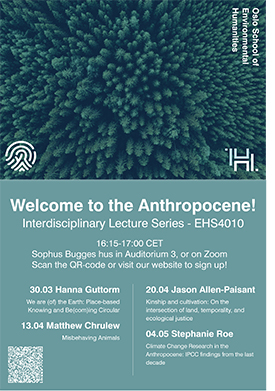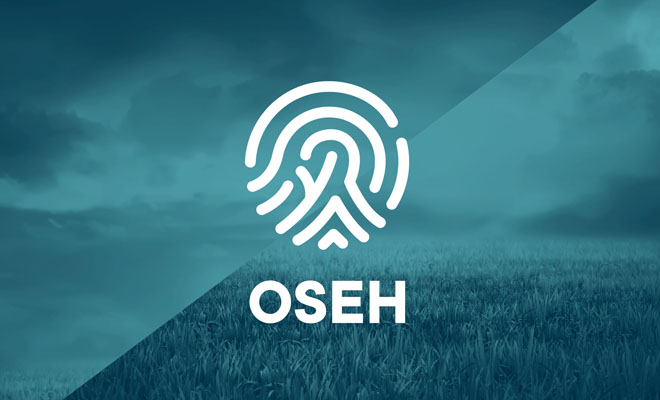Events
In 2023, OSEH hosted a series of varied events in line with our aims and visions. Below we’ve gathered some of the highlights from the year – a comprehensive list of events and more details can be found on our webpage under News and Events.
Environmental Humanities Lecture Series
OSEH hosted a total of five Environmental Humanities Lectures in 2023, co-organised by the OSEH working group, featuring a variety of topics from leading scholars in the field:
Organized by OSEH:
• “Children, cars, and climate change: an environmental history of playgrounds” by Ben Highmore
• “Whales as anthropological subject in Arctic Norway”. A conversation by Sadie Hale and Britt Kramvig
• “Nothing about Antarctica without Antarctica” by Alejandra Mancilla
• “Why Singapore’s Monkeys Can’t Be Sacred: Law, Sovereignty, and the Agency of Animals in the Surveillance State” by Stuart Earle Strange
• “South Asian Environmental Humanities” by Nayanika Mathur and Radhika Govindrajan
Organized as part of the workshop “Ecologies of Health and Disease in Eurasia”(organised by Johanna Conterio):
• “Communist Bodies and Capitalist Bodies: What Radiation Medicine Tells us about Cold War Understandings of Ecological Health” by Kate Brown
Welcome to the Anthropocene Lecture Series:
In 2023, OSEH continued organizing the interdisciplinary lecture series “Welcome to the Anthropocene” as an event both open to the public, and at the same time an integral part of our Honours Certificate Environmental Humanities and Sciences (EHS) EHS4010. We held the Anthropocene lectures physically in Oslo, but also streamed them via Zoom to enable international attendance, and later published the lectures as open-access talks on our website. The lecture series featured four leading international scholars exploring how their disciplines are responding to both the concept of the Anthropocene, and to the planetary crisis that is designates:
• “We are (of) the Earth: Place-based Knowing and Be(com)ing Circular” by Hanna Guttorm
• “Misbehaving Animals” by Matthew Chrulew
• “Kinship and cultivation: On the intersection of land, temporality, and ecological justice” by Jason Allen-Paisant
• “Climate Change Research in the Anthropocene: IPCC findings from the last decade” by Stephanie Roe
The lecture series will continue in 2024, and the full programme will be posted here.
This Land on which our Ancestors Lived
In this conversation, held at Domus Bibliotheca, Indigenous Sámi human rights-and land defenders were convened to speak on their relationship to land as well as their land-based practices. In so doing, they challenged the Western and colonial understanding of land and the consequent disregard of the subjectivity of non-human entities, exploring the notions of land rights and the process of landback. The conversation was commissioned by OSEH and facilitated by Sámi scholar Dr. Liisa-Rávná Finbog. The other panelists were poets and human rights and land defenders Ida Helene Benonisen and Timimie Märak, influencer and human rights and land defender Emmi Nuorgam, and politician, duojár and human rights and land defender Beaska Niillas.
PhD Researcher School “Planting the Environmental Humanities” and “Transdisciplinarity in the Environmental Humanities” Symposium
In September, with co-funding from the Norwegian Researcher School in Environmental Humanities (NoRS-EH), OSEH hosted a two-day PhD Researcher School. 14 PhD research fellows from 11 different institutions and six different countries attended PhD Researcher School at Oslo’s Botanical Gardens. The Researcher School had place-based teaching, writing exercises and discussions led by a group of leading scholars from a range of disciplinary backgrounds.
The following two days, OSEH hosted a symposium on “Transdisciplinarity in the Environmental Humanities”, with one day at Oslo’s Museum of Cultural History and one day at Blindern campus. The symposium aimed to highlight the innovative environmental humanities research happening in Norway and neighbouring Scandinavian countries, especially by early career researchers, and included keynote lectures by Dolly Jørgensen (University of Stavanger) and Kate Rigby (University of Cologne). Several of the PhD students who attended the preceding Researcher School presented their research and chaired sessions at the symposium.
Environmental diversity now!
In October, we celebrated OSEH’s final event with a public event at SALT in downtown Oslo. The program included a keynote lecture by Professor, poet and nature writer Camille Dungy, and a round table on cultivating new grounds in the Environmental Humanities, featuring Christof Mauch (Rachel Carson Center for Environment and Society/LMU Munich), Heather Swanson (Aarhus University), Rahul Ranjan (OsloMet University), and Liisa-Ravna Finbog (Tampere University). The evening continued with “upcycled rhythmic background vibe music”, soup, and celebration.
Eco-Slam
Since the beginning of OSEH, our aim has been to closely integrate students into environmental research activities. At our yearly “Eco-Slam” in November, EHS students showcased their creative final research projects developed in the course EHS4000 – Knowing Natures: Environmental Research Seminar where they experiment with interdisciplinary methods and develop creative and arts-driven forms of research dissemination. Like in the previous year, we were impressed by the creativity and varied set of innovative projects. The Eco-slam was open to the public, and included projects presenting film screenings, paintings, poetry, sound installations, a game, photography exhibitions, and more.
Research
Research at OSEH covers a wide span of disciplines. In 2023, we hosted the following OSEH collaboratories:
• Anthropogenic Soils (PIs: Ursula Münster and Daniel Münster, IKOS)
• Bionic Natures (PIs: Hugo Reinert and Rachel Douglas-Jones, IKOS)
• Fluid Dynamics Marine Communities, Territory Work, and Ecosystem Change in Anthropic Oceans (PI: Florence Durney, IKOS)
• Media Seas of the High North Atlantic (PI: Liv Hausken, IMK)
• Monsters of the Anthropocene (PI: Rebecca Scherr, ILOS)
• Restorations Mending Heritage Landscapes and Biodiversity (PIs: Ane Ohrvik and Karen Lykke Syse, IKOS)
• Worlds of Meaning in Conservation (PIs: Sara Asu Schroer and Thomas Van Dooren, IKOS)
All remaining OSEH Collaboratories came to an end in 2023.
External funding
OSEH’s Working Group member Kjetil Fallan (IFIKK) used OSEH’s research environment to develop a project proposal that was granted funding from the Norwegian Research Council for the project “Designing with/out Extractive Materials”. The project will investigate the decision-making process in design and its influence on consumption, tracing its evolution from the second industrial revolution to the present day.
Welcome to the Anthropocene
The volume “Welcome to the Anthropocene. Perspectives from Twelve Academic Disciplines” was a direct outcome of OSEH’s first Welcome to the Anthropocene.jpg) lectures series in 2021 (as part of the course EHS4010 – Welcome to the Anthropocene: Interdisciplinary Lecture Series). The volume is edited by Ursula Münster, Thomas Hylland Eriksen, and Sara Asu Schroer. The book consists of fifteen perspectives on the Anthropocene written by scholars with backgrounds in over a dozen academic disciplines – archaeology, biology, geology, cultural history, literature, art history, science and technology studies, anthropology, political ecology, geography and law. “Welcome to the Anthropocene” was published open access, and is available on the publisher’s website (Scandinavian Academic Press).
lectures series in 2021 (as part of the course EHS4010 – Welcome to the Anthropocene: Interdisciplinary Lecture Series). The volume is edited by Ursula Münster, Thomas Hylland Eriksen, and Sara Asu Schroer. The book consists of fifteen perspectives on the Anthropocene written by scholars with backgrounds in over a dozen academic disciplines – archaeology, biology, geology, cultural history, literature, art history, science and technology studies, anthropology, political ecology, geography and law. “Welcome to the Anthropocene” was published open access, and is available on the publisher’s website (Scandinavian Academic Press).
Teaching
We were excited to welcome 26 students from 16 different Master’s programmes to the third year of teaching in the Honours Certificate in Environmental Humanities and Sciences (EHS).
For the course EHS4010 – Welcome to the Anthropocene: Interdisciplinary Lecture Series, we had four leading international scholars exploring how their disciplines are responding to both the concept of the Anthropocene, and to the planetary crisis that is designates. See above under “Events“ for more on the lecture series.
The mandatory course EHS4000 – Knowing Natures: Environmental Research Seminar runs over two semesters. In the spring semester, we conducted several place-based excursions: a forest walk and landscape noticing walk at Alna, an Akerselva river walk, a soil excursion at Bygdøy and an excursion to an architectural food forest project. The EHS also hosted a methods workshop on GDPR, data storage, and project development for the students in June The students’ final projects for the course were presented at an Eco-slam in December (see more under “Events” above).














